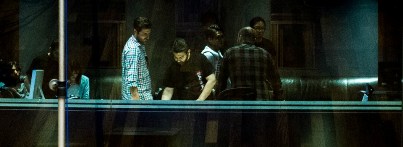
|
«I love finding new sounds and find alternative ways of using instruments» -Firstly, thanks very much, Nima, for this interview. -To begin, tell us about your chidhood in Iran. How did start an interest in music in that child who slept with the sound of the Santour? Well, I was introduced to the Santour by my uncle. I was a horrible sleeper, so my parents used to hand me to my uncle to play the Santour for me to fall asleep to. It usually worked :). I picked up the instrument from the age of 5 and started taking lessons with many renowned Santour masters. -You start your music studies too young. What training did you receive in your country before travelling to United States? -Was there any reason why you choose Washington to Boston or Los Angeles for continuing your musical training? Had you decided to be a composer for audiovisual or you make this decision until later? -After passing through Washington you arrive at Los Angeles. When you get there; it was with the aim of being your training or also to look for work as composer? When I left DC my intentions were to move away from the medical world, which was my major at the time and to study music exclusively, but the path of film music was not set yet. I have always loved film and one of the scores that caught my ear was Black Hawk Down and the use of many Middle Eastern instruments within it. I used to just play the Santour against some of the music and I loved it. Thats when things changed and I decided that film music was something I wanted to pursue. -Is very difficult to find a job for a beginner composer in a town with a fierce competition in this sector? Yes, of course. I was fortunate enough to be able to find work from the very beginning. My first job in Hollywood was with Christophe Beck, and my task was moving his studio from one location to another. I learned many things from Chris… After that I was at Remote Control for 3 years. -Has there been any projects in which you went back to Remote Control? I have mixed scores with the talented team there. As a matter fact I mixed Gatchaman at Remote Control. -You have studied Ethnomusicology, Anthropology, and Instrument Making. How it applies this training in music composition? -I have read that you has made some musical instruments. What kind of instruments? Do you use its sounds for your compositions? Yes, I modified a traditional Persian Classical instrument the Setar. I wanted some bass tonalities, which rarely exist on that instrument. The traditional Setar has 4 strings but I added 2 more strings to get some resonation and bass tones, and replaced the face of the instrument with a membrane. -Let´s talk about your last work, nothing less than Gatchaman, live action movie of legendary anime series Battle of the Planets. How you came to work in a project for a industry like japanese, very closed to outside? I actually received a call about the project and being a fan of the series I immediately said yes. -Which was the line work together Tôya Satô to find what kind of music need for the movie? -Do you feel more pressure with this kind of project or it´s has been a quiet work to you for compose this soundtrack? Every project is very different. The challenge with this project was the time. I had a 4 weeks to compose over two an half hours of music but, I love being on a time crunch. It keeps me on my toes. -Did you feel curious to watch the original series and listen the music composed by Bob Sakuma for it? -One of the things that strikes me in the soundtrack is the solemnity at «White Eagle» theme compared to the others characters themes. Is that because he is the leader or is there some other reason for this? Well, Ken has a back story and it has to be told, the Gatchaman theme comes from that piece and evolves. «White Eagle» was the first piece I wrote for the film and it gets repeated many times throughout in different variations. -I love the amazing Far West sound that appears in themes like «Lidth’s Day», «Falcon» o «Ifrita». How did the idea to mix this kind of music with electronic music? The result is simply stunning. We are dealing with Birds :). This is is simply the result of great ideas that Toya had and we wanted to see what we could come up with. I am always looking to incorporate different instruments from many cultures in my movies so Toya just allowed me to achieve that. -Are you happy with the outcome of this score? Do you expect through this work your agenda have many more projects to compose for films? It was a pleasure to be able to work on this film, and I think the end result is great. Yes, there has already been talks about more projects in Japan in the near future. -Changing topic. I am intrigued to know what is «Exists»… a movie, a documentary? Are you still composing for this or the score is finished? -Before concluding; you are very young ( I know you celebrates your birthday this month. Happy birdthday in advance) and the future is very bright for you. What Nima Fakhrara have been dream about this future?? Thanks for the birthday wishes :). My only wish is for talented filmmakers to be able to make the films that they envision and for them to get the recognition that they truly deserve, and for me to be part of this journey! Nima, thanks for making time for us in your busy schedule. From BSOSpirit wishing you all the best and hope that in future we can speak again with you. It has been my pleasure. |
Author BIOGRAFÍA: Nima Fakhrara es un compositor afincado en Los Angeles, que ha trabajado con directores como el ganador del Globo de Oro Hany Abu Assad, y el director de El Proyecto de la Bruja de Blair, Eduardo Sánchez. Sus trabajos más recientes son Gatchaman, dirigida por Toya Sato y protagonizada por Tori Matsuzaka y Ryohei Suzuki, un ‘Live Action’ de la serie de anime La Batalla de los Planetas, Site 146, dirigida por Gregory Levveseur , protagonizada por Denis O’Hare y Ashley Hinshaw , y producida por Alexander Aja (Piranha 3D), y Exists, dirigida por Eduardo Sánchez y protagonizada por Dora Madison Burge y Brian Steele. Nima Fakhrara is a Los Angeles based film composer, who has worked with directors such as Golden Globe winner Hany Abu-Assad, and the father of found footage, Eduardo Sanchez. His most recent scores are to Gatchaman, directed by Toya Sato and starring Tori Matsuzaka and Ryohei Suzuki,a live action take on the anime series Battle of the Planets, Site 146, directed by Gregory Levveseur, starring Denis O’Hare and Ashley Hinshaw, and produced by Alexander Aja (Piranha 3D), and Exists, directed by Eduardo Sanchez and starring Dora Madison Burge and Brian Steele. Born in Iran, Nima’s first experience with music was listening to his uncle play the santour. Influenced by this, he studied santour and became well versed in Persian classical music. After moving to the United States, Nima continued his musical studies and attended California State University Northridge where he obtained his degree in composition studies. However, his interest in music was not limited to composition and performance. He studied ethnomusicology, anthropology, and how to construct instruments, which has led to signature sound in Nima’s music. This is apparent in his sampling and use of instruments from many regions of the world in various genres of film. The use of these new sounds alongside orchestral and ambient textures is a defining characteristic in his scores. In 2009, Nima opened Sound and Vision Creatives, where he alongside his most used musicians are housed. Here you have his website:
|


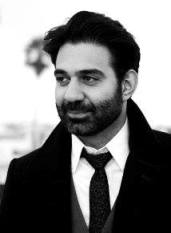 Thanks to you.
Thanks to you.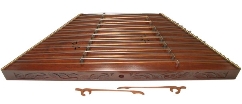 I studied the Santour exclusively, with many of the biggest masters, such as Saeed Sabet, Parvis Meshkatian, and Faramarz Payvar. I learned all the scales and modes of Persian Classical Music back in Iran and have continued learning more and more to this day. There are so many different scales in Persian Classical Music that one needs a life time of work to understand everything. Persian Classical Music deals with quarter tones, so all those notes between notes make up a ton of different scales.
I studied the Santour exclusively, with many of the biggest masters, such as Saeed Sabet, Parvis Meshkatian, and Faramarz Payvar. I learned all the scales and modes of Persian Classical Music back in Iran and have continued learning more and more to this day. There are so many different scales in Persian Classical Music that one needs a life time of work to understand everything. Persian Classical Music deals with quarter tones, so all those notes between notes make up a ton of different scales.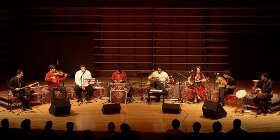 I was young when I moved to US with my family, so I didn’t have a choice. When I moved to DC, I started perfoming as a Santour player with the Chakavak Ensemble, which later on I started composing music for. That was were everything changed for me. Where I enjoyed composing more then playing music. I was a rebel from the beginning of my musical training. There is a strict regiment to follow in Persian Classical Music but I always played everything the way I wanted to play them and my teachers frowned upon that.
I was young when I moved to US with my family, so I didn’t have a choice. When I moved to DC, I started perfoming as a Santour player with the Chakavak Ensemble, which later on I started composing music for. That was were everything changed for me. Where I enjoyed composing more then playing music. I was a rebel from the beginning of my musical training. There is a strict regiment to follow in Persian Classical Music but I always played everything the way I wanted to play them and my teachers frowned upon that.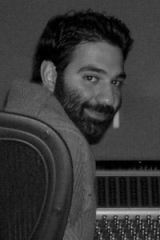 I love finding new sounds and find alternative ways of using instruments, so that training applies in many different ways in my scores. I like taking unusual instruments from different parts of the world and using their sounds in very different ways. I constantly use African percussion, or Middle Eastern instruments to create textures. I use them in a way to make them not recognizable.
I love finding new sounds and find alternative ways of using instruments, so that training applies in many different ways in my scores. I like taking unusual instruments from different parts of the world and using their sounds in very different ways. I constantly use African percussion, or Middle Eastern instruments to create textures. I use them in a way to make them not recognizable. Toya and the team already had the sense of direction they wanted to go with. This is a superhero movie so the music had to be big and epic. But, there are some very intimate sections to the film and the music needed to reflect that. I keeped a thematic idea throughout the film and changed slightly to reflect the team members individually.
Toya and the team already had the sense of direction they wanted to go with. This is a superhero movie so the music had to be big and epic. But, there are some very intimate sections to the film and the music needed to reflect that. I keeped a thematic idea throughout the film and changed slightly to reflect the team members individually.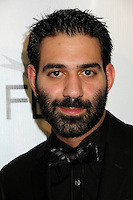 Being a fan of the series, I had watched the shows and have listened to the theme, but the the movie is different and it needed to have a different kinda of sound, so thats where my themes come in.
Being a fan of the series, I had watched the shows and have listened to the theme, but the the movie is different and it needed to have a different kinda of sound, so thats where my themes come in.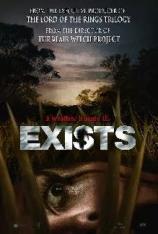 The film is directed by Eduardo Sanchez (Blair Witch Project, Lovely Molly) who is the father of all found footage. Being a fan of his work I contacted him about Exists and we started talking about it. It is a really cool take on Bigfoot. Exists is a found footage film and its tricky to come up with music that does not take the audience away from the reality of the scenes. So we did some crazy stuff to create an atmosphere that was real, but yet haunting. We sledge hammered pianos, a cello, and many other percussion instruments. Some of my own footsteps were even recorded for the score.
The film is directed by Eduardo Sanchez (Blair Witch Project, Lovely Molly) who is the father of all found footage. Being a fan of his work I contacted him about Exists and we started talking about it. It is a really cool take on Bigfoot. Exists is a found footage film and its tricky to come up with music that does not take the audience away from the reality of the scenes. So we did some crazy stuff to create an atmosphere that was real, but yet haunting. We sledge hammered pianos, a cello, and many other percussion instruments. Some of my own footsteps were even recorded for the score.

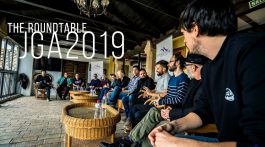
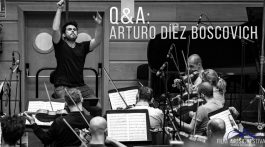
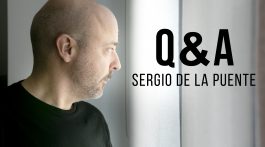
No hay comentarios